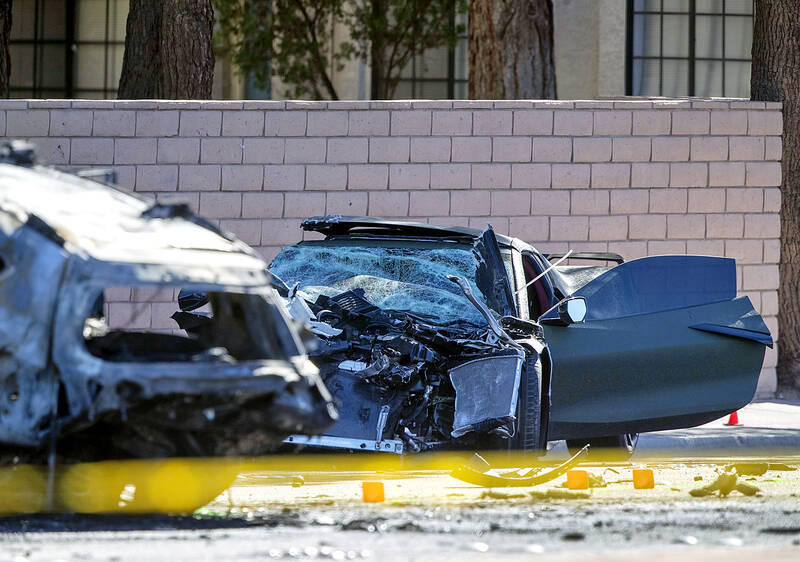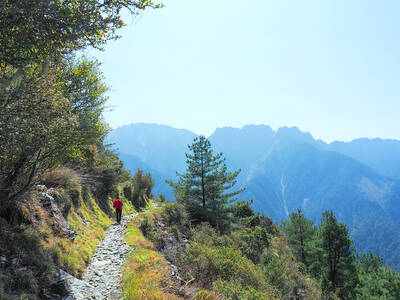Police and driving instructors in Japan have adopted an unorthodox approach to road safety in the hope of reducing incidences of drink-driving — by allowing drivers to consume alcohol before getting behind the wheel.
Chikushino driving school in the south-western city of Fukuoka recently began offering controlled drink-driving experiences as part of a police campaign to convince “overconfident” motorists never to drink and drive.
The initiative was launched around the 17th anniversary of the deaths of three children from the city — two boys aged four and three, and their one-year-old sister — who died when their family car was struck by a municipal government employee who was driving under the influence of alcohol.

Photo: AP
Drivers taking part in the recent experiment included two reporters from the Mainichi Shimbun — one who drank and drove, and another who observed her colleague as a sober passenger.
The drivers were first asked to negotiate three sections of road — a slalom, an S-bend and a series of tight curves — while sober. The newspaper reporter, Hyelim Ha, then drank a 350ml can of beer, as well as a cup each of umeshu plum wine and shochu spirit — both mixed with water — over the course of about an hour.
A breathalyser test on Ha detected 0.30mg of alcohol per liter of breath, twice the threshold of 0.15mg, the newspaper said.
Despite having cold hands, a raised heart rate and red face, Ha said she felt able to drive — a sentiment reportedly expressed during questioning by the driver who caused the fatal collision in 2006.
Ha’s confidence was misplaced. Her fellow reporter, Rokuhei Sato, lurched back and forth as Ha repeatedly accelerated and slowed down unnecessarily along a straight section of road. She managed to clear the bollards on the slalom course, but was brought to a halt by the school’s vice head, Shojiro Kubota, before she took on the S-bend.
To Ha’s apparent surprise, Kubota told her she had entered a curve at a higher speed after drinking, and at one point had strayed into the opposite lane.
“Even though [drinking] impairs the skills people need for driving, such as cognitive capacity, judgment and vehicle maneuvering ability, the driver assumes they are driving safely — that’s the danger of drink-driving,” Kubota said, according to the Mainichi.
Japan’s national police agency says that many drivers who drink and drive without incident develop a sense of invincibility and continue to repeat the same dangerous behaviors.
It cited data showing that the probability that a road traffic accident will involve a death is seven times higher when the driver has drunk alcohol compared with accidents in which the driver is sober.
“We are calling on people to properly manage the risks before drinking, such as not driving to the pub in the first place, on the premise that once they are drunk, they are unable to make normal judgments,” Yoichi Furukawa, deputy chief of the prefectural police’s traffic enforcement division, told the newspaper.

June 9 to June 15 A photo of two men riding trendy high-wheel Penny-Farthing bicycles past a Qing Dynasty gate aptly captures the essence of Taipei in 1897 — a newly colonized city on the cusp of great change. The Japanese began making significant modifications to the cityscape in 1899, tearing down Qing-era structures, widening boulevards and installing Western-style infrastructure and buildings. The photographer, Minosuke Imamura, only spent a year in Taiwan as a cartographer for the governor-general’s office, but he left behind a treasure trove of 130 images showing life at the onset of Japanese rule, spanning July 1897 to

In an interview posted online by United Daily News (UDN) on May 26, current Chinese Nationalist Party (KMT) Chairman Eric Chu (朱立倫) was asked about Taichung Mayor Lu Shiow-yen (盧秀燕) replacing him as party chair. Though not yet officially running, by the customs of Taiwan politics, Lu has been signalling she is both running for party chair and to be the party’s 2028 presidential candidate. She told an international media outlet that she was considering a run. She also gave a speech in Keelung on national priorities and foreign affairs. For details, see the May 23 edition of this column,

One of the most important gripes that Taiwanese have about the Democratic Progressive Party (DPP) is that it has failed to deliver concretely on higher wages, housing prices and other bread-and-butter issues. The parallel complaint is that the DPP cares only about glamor issues, such as removing markers of Chinese Nationalist Party (KMT) colonialism by renaming them, or what the KMT codes as “de-Sinification.” Once again, as a critical election looms, the DPP is presenting evidence for that charge. The KMT was quick to jump on the recent proposal of the Ministry of the Interior (MOI) to rename roads that symbolize

Jade Mountain (玉山) — Taiwan’s highest peak — is the ultimate goal for those attempting a through-hike of the Mountains to Sea National Greenway (山海圳國家綠道), and that’s precisely where we’re headed in this final installment of a quartet of articles covering the Greenway. Picking up the trail at the Tsou tribal villages of Dabang and Tefuye, it’s worth stocking up on provisions before setting off, since — aside from the scant offerings available on the mountain’s Dongpu Lodge (東埔山莊) and Paiyun Lodge’s (排雲山莊) meal service — there’s nowhere to get food from here on out. TEFUYE HISTORIC TRAIL The journey recommences with